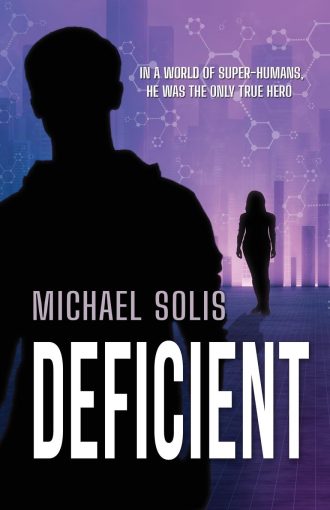The near future is progressively free from discrimination based on race, class and sexual orientation. But in a world populated by the gifted, fifteen-year-old Alejandro Aragon (Alé) is part of the only remaining minority – he’s a Deficient. Powerless. The one that accelerated genetics left behind.
Ale knows that he’ll need a miracle to graduate and pursue his dream of a legal career in the capital. His only ally is his best friend Yalamba, an outspoken and exceptionally gifted artist renowned for her unique ability to draw things into existence. But when she’s kidnapped in a hate crime against her ability, it appears that Alé has every motive and no believable alibi. To prove his innocence and to track down the real culprit, Alé teams up with the other outcasts in school, who each have their own reasons for getting involved.
But the deeper they dig, the more they fear Yalamba’s kidnapping is linked to a string of unsolved murders against the exceptionally gifted. With time running out, Alé must discover who he really is if he and his new friends plan to track down the culprit, clear his name and rescue Yalamba — all before she herself is drawn out of existence.
In Deficient, Solis paints a vivid picture of a world reshaped after the Great Catastrophe, where Achewon Academy mirrors the complex dynamics of a society. Within its walls, the hierarchy of abilities/gifts (Atlases, racers, sky Gliders, Know-it-Alls, Mind-Movers, Unseens, Legions, Ferals and Deficients), from common to rare, dictates power dynamics, setting the stage for bullies like Landon Waters, who prey on those they deem inferior. As I read the novel, I found myself drawn to the strong relationships between characters, particularly finding solace in Alé’s friendship with the talented artist Yalamba Koroma, especially after she falls victim to a hate crime.
The narrative weaves together suspense, action and mystery, pulling readers into the vibrant tapestry of Achewon Egalitarian Academy. From the exhilarating Achewon Dodgeball Tournament to the quieter moments of self-discovery, the story keeps you on the edge of your seat, fully engaged in its world.
What struck me most were the characters: Gwen Manghi, Kazuki Tanaka, Mixie Trait and Kaylee Kerrain were all well developed, each adding their own flavor to the plot. However, it was the contrast between the mind-movers, ferals and Atlases that truly fascinated me. The mind-movers and ferals seemed to possess a strength that outshone the Atlases, adding depth to the power dynamics within the school. The unexpected twist towards the end of the story in revealing the people behind the kidnappings makes it an awesome read.
While the LGBT+ aspect of the story may not have been immediately apparent when Ale and Gwen stumbled upon Langdon with another boy, I couldn’t shake the feeling that there was more to it. And indeed, when Langdon finally comes out of the closet, it feels like a natural progression, adding another layer to his character arc.
Throughout the novel, Solis deftly explores themes of identity, friendship and societal norms, all while maintaining a sense of humor and suspense. It’s this delicate balance that sets Deficient apart in the YA, sci-fi genre. Whether you’re a fan of mystery or sci-fi, or simply love a good story, I wholeheartedly recommend it.
– Weldon Ngetich


